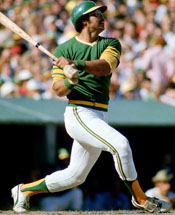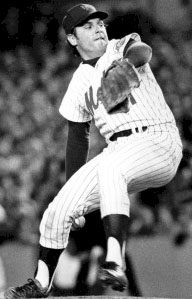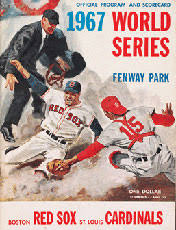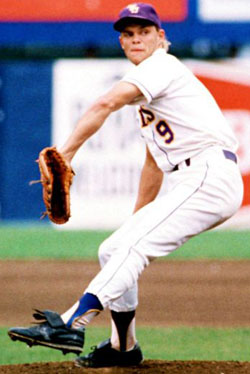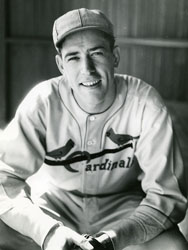|
May 19, 2024
Baseball Short Story
"Get Him the Hell Off My Ball Team"
Rube Waddell became a Hall of Fame pitcher for Connie Mack's Philadelphia Athletics in the new American League. But before he joined the A's, he played for Louisville, Pittsburgh, and Chicago in the National League. Waddell was undoubtedly the biggest "flake" in the history of baseball.
Here's an excerpt from Alan H. Levy's book Rube Waddell: The Zany, Brilliant Life of a Strikeout Artist. As the 1901 season approached and the players reported for spring training, Ban Johnson and the American League took off the gloves. Johnson had prepared well, and he was ready to go into direct competition with the senior circuit. ... Johnson set up teams in two of the cities the NL had abandoned — Baltimore and Washington. And he placed three more teams in direct competition with the National League, setting up shop in St. Louis, Boston, and Philadelphia. Connie Mack moved from Milwaukee to Philadelphia to manage the new Athletics.
The baseball wars heated up even more when the owners of these new teams began raiding National League rosters, offering fat salary increases to lure players away.
The name Waddell certainly occured to some of the American Leaguers. Rube was not yet 25, but was already quite the item. No pitcher in baseball had ever become such a benchmark so quickly as did the Rube. The Pittsburgh papers postulated that, despite his fame, or rather because of it, Rube would be secure. "Everyone knows Waddell is a good pitcher, but everyone in baseball is also aware that he is hard to handle."
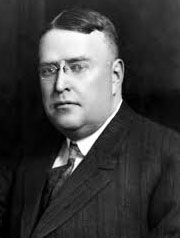 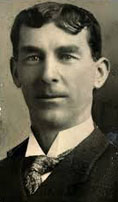 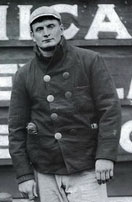 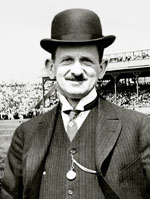 L-R: Ban Johnson, Connie Mack, Rube Waddell, Barney Dreyfuss The American League owners had agreed with one another as to who could court which player. Rube was "given" to Boston. The Pilgrims knew all about Waddell. Nonetheless, they were "hard after Rube" according to Barney Dreyfus (the owner of the Pirates). The Pilgrims offered Rube nearly double his salary. Rube was firm, though: "I'll pitch for Pittsburgh or for no one. I don't like that town of Boston anyhow. I'll stick to Pittsburgh."
Connie Mack went quietly behind the backs of his Boston brethren and wrote Rube that if he went to Boston and did not like it, he could pitch for Philadelphia and earn $2000 more than either his Boston or his Pittsburgh figure.
Mack later reflected that Rube was never concerned with money; he had the mind of a child. A child will always focus on the positives, and Rube was doing just that amidst all the baseball raiding that spring. Things were good in Pittsburgh, and Pittsburgh was where he was going to stay. He was not going to think about any previous problems, let alone matters like labor unions or salary offers from competitors, and he likely believed, albeit naively, that others like Dreyfuss and Fred Clarke (manager of the Pirates) felt the same way. To Rube this wasn't business, it was baseball.
Having nearly won the pennant in 1900, Clarke and the Pirates were quite optimistic about the new season. They all went off to Hot Springs AK for pre-season training. Rube was the life of the party on the train, singing songs all the way down. Connie Mack once pleaded with Rube to give up his life of "wine, women, and song." Rube responded by asking if it was all right if he just gave up singing. On that long train ride down to Arkansas, many a Pittsburgh Pirate wished he had, as the Rube could always be depended on to sing very badly and very loudly.
Clarke put the team through daily regimens of running, calisthenics, and baseball. The first day out, the team ran a three-mile loop. Rube got lost. He made the most of it, though. He had brought a gun with him, so he got in some hunting and arrived back proudly displaying several ducks. Clarke shook his head. There was a method to Rube's madness here, however. The previous day it had been raining, and everyone stayed inside except Rube. He went out looking for the ball field. During his search he got lost then, too, so bringing the gun along for the next day's run seemed a good idea. Rube logic!
Rube was the toast of the town, naturally. Out of the blue, folks sent him baskets of Easter eggs. When he went to Hot Springs' new movie house, the band struck up "When Reuben Comes to Town." Rube immediately took the podium and conducted. Thankfully, he did not break into song.
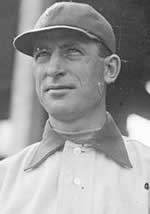 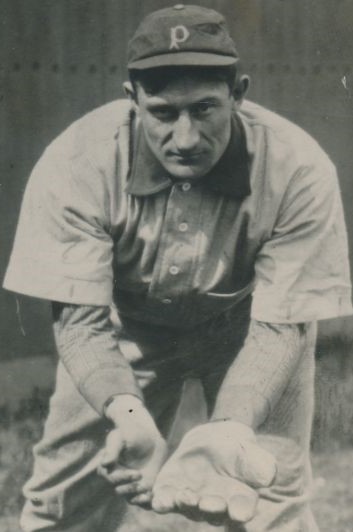 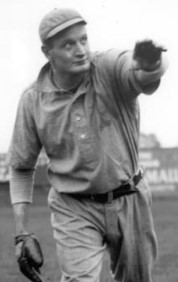 L-R: Fred Clarke, Honus Wagner, Rube Waddell with Athletics Clarke and the Pirates were a rough and tumble lot. Modern managers would have heart attacks at some of the "training" Clarke employed, given how it imperiled his star players. On April 5, for example, Clarke oversaw an intra-squad game — of football — with no pads, no helmets, just a ball and a bunch of very large men. And this was no mere game of "two-hand touch." Honus Wagner took a mean elbow in the face and spent much of the afternoon repairing his bleeding countenance in a cold stream.
Rube took the game seriously ... Midway in the game Rube was going after a loose ball and, in rugby-style rules of the day, attempted to kick it. But just as he gave a mighty swing with his leg, an opponent grabbed the ball. Rube thus did a "Charlie Brown," kicking nothing but air. His momentum swung him completely around. He landed on his head and "made a large noise like an Indian." The rest of the team thought he was faking, and the game went merrily on. The doctor said Honus Wagner had a fractured nose and Waddell a sprained ligament in his right hip. Both turned out for practice the next day anyway. Rube was a little stiff and sore, so two days after the football game, he was excused from practice. He went out to the gate, sold tickets, and greeted fans. Baseball, springtime, and the Rube; it was an irrepressible combination.
The Pirates left Arkansas and journeyed to Cincinnati for the season opener. Unfortunately it rained. Clarke was never willing to sit still, if only for the mischief Rube would doubtlessly create. He secured the use of the practice facilities of a nearby army base. The servicemen all turned out, mainly to see the Rube. A number of them were recent veterans of the war with Spain, and Rube ended up receiving a host of souvenirs from Cuba and the Philippines.
The Pirates finally opened their season against Cincinnati on April 22. They won.
Rube's first start came the next day against St. Louis. He was great for six innings. In the seventh, however, "the balloon could easily be seen going skyward." The Cardinals scored five runs, two of which came via a wild throw from Rube as he was fielding a bunt. Rube could be troubled when dealing with pressures, and he was feeling them since one of the new National League rules demanded rosters be trimmed to 16 players by May 1. The Pirates were over the limit. Rube pitched in a practice game the next day against a local college. The following day the Pirates sounded an old refrain: where is Rube?
Rube had gone home to Prospect PA, with a few refreshment stops on the way. His father brought him back to Exposition Park on May 2. John Waddell, Sr., had once met with Pirate management and asked them to be patient with his son, feeling screwiness ran in the family and admitting to being a bit off himself. Barney Dreyfuss had smiled at it all, but no one could mollify Clarke with such a tidbit of insight.
Clarke immediately tossed Rube out to the mound to face the Chicago Orphans, as they were then called (sometimes they were called the Remnants. "Cubs" came in 1905.) With his father in the stands, Rube showed nothing — no speed, no snap on his curves, no control. In the first inning he gave up three hits, a wild pitch, and four walks. Rarely before had Rube walked four in a game. On this afternoon, Chicago had batted all nine players before Clarke relieved Rube with just one out in the first.
The day after the loss to Chicago, Rube received a letter from a local furniture dealer: "If you lose your position with the Pittsburgh club owing to the game you pitched against Chicago on Wednesday, we will give you $50 a week to drive one of our delivery wagons." Rube was certainly big enough to handle the task of furniture moving, and, annualized, the weekly salary topped the paltry $1200 Dreyfuss was paying him.
Maybe Rube should have taken the offer from the furniture company, for that night Clarke stormed into Dreyfuss' office. "Sell him, release him, drop him off the Monongahela Bridge," Clarke fumed. "Do anything you like, as long as you get him the hell off my ball team!" When Rube heard he had been sold, he ran into Dreyfuss' office and demanded half of the selling price. "You can't have it all," Rube argued. (Rube logic!) Dreyfuss went him one better. "You can have it all," Dreyfuss calmly replied. "It's right here on my desk." And there it all was — a cigar. Rube had been sold for a stogie. On May 3, the Chicago team left Pittsburgh, and Rube was on the train with them. He was now an Orphan.
Editor's note: The story of Waddell being sold for a cigar has been debunked. While the sale price was never disclosed, Chicago had shown a great deal of interest in Rube, and Dreyfuss wasn't about to give away so valuable a commodity. It seems plausible that Barney told Rube he was sold for a cigar to end Waddell's demand for half the purchase price. |
